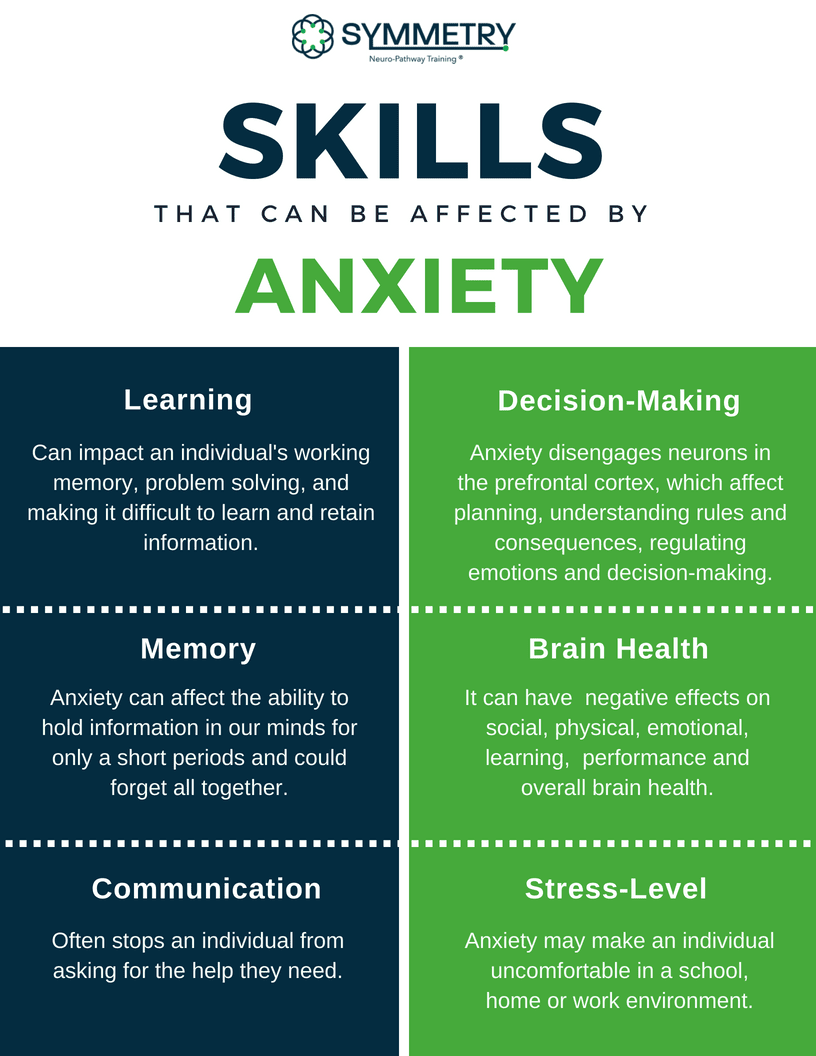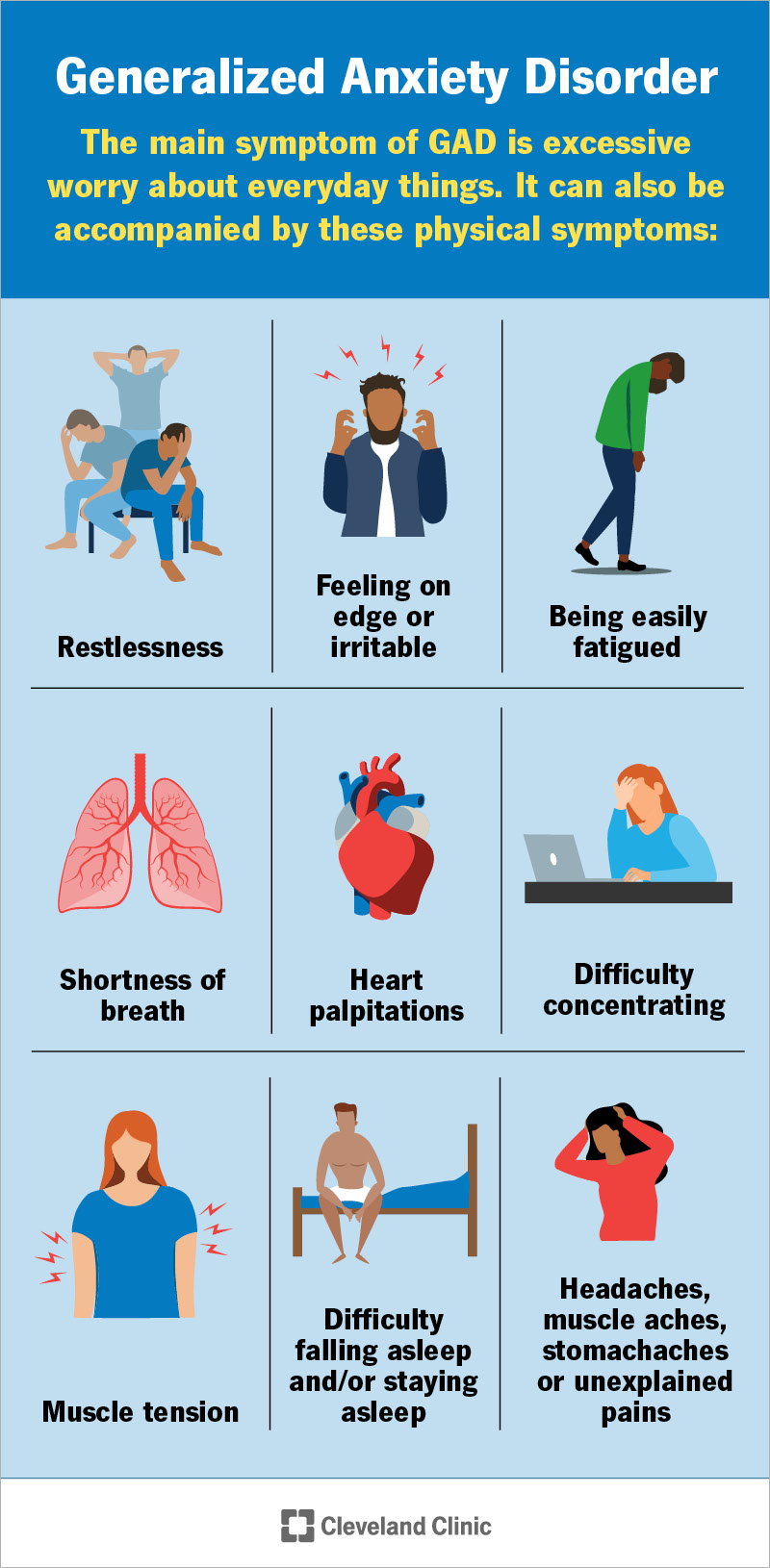Hey there! Have you ever experienced that rapid heartbeat, sweaty palms, and a knot in your stomach right before a big presentation or an important event? Well, my friend, you might have encountered the little troublemaker called anxiety. In this article, we’ll explore the fascinating world of anxiety and its effects on our daily lives. We’ll uncover its causes, symptoms, and shed light on how it can impact our overall well-being. So, sit back, relax, and let’s dive into the world of understanding anxiety and its effects!
What is Anxiety?
Definition of anxiety
Anxiety is a normal and common human experience characterized by feelings of unease, fear, and worry. It is a natural response to stress and can help us stay alert and focused in challenging situations. However, when anxiety becomes excessive, prolonged, and starts interfering with daily life, it may be indicative of an anxiety disorder.
Types of anxiety disorders
There are several types of anxiety disorders, each with its own distinct set of symptoms and triggers. These include generalized anxiety disorder (GAD), panic disorder, social anxiety disorder, specific phobias, and obsessive-compulsive disorder (OCD). While the specific symptoms and severity can vary, all types of anxiety disorders involve excessive and irrational fears or worries that can disrupt a person’s daily routines and activities.
Causes of Anxiety
Biological factors
Biological factors play a significant role in the development of anxiety. Imbalances in chemicals in the brain, such as serotonin and dopamine, can affect the regulation of mood and emotions. Additionally, certain medical conditions, such as thyroid disorders and heart disease, can contribute to the development of anxiety.
Environmental factors
Environmental factors, such as traumatic experiences, stressful life events, and ongoing exposure to stressful environments, can trigger or worsen anxiety. Childhood trauma, including physical or emotional abuse, neglect, or the loss of a loved one, can have a long-lasting impact on mental health and increase the risk of developing anxiety disorders later in life.
Genetic factors
Genetics can also play a role in the development of anxiety disorders. Having a family history of anxiety or other mental health conditions can increase an individual’s susceptibility to developing anxiety. However, genetics alone do not determine the development of anxiety disorders, and other factors, such as environment and life experiences, also contribute to their onset.
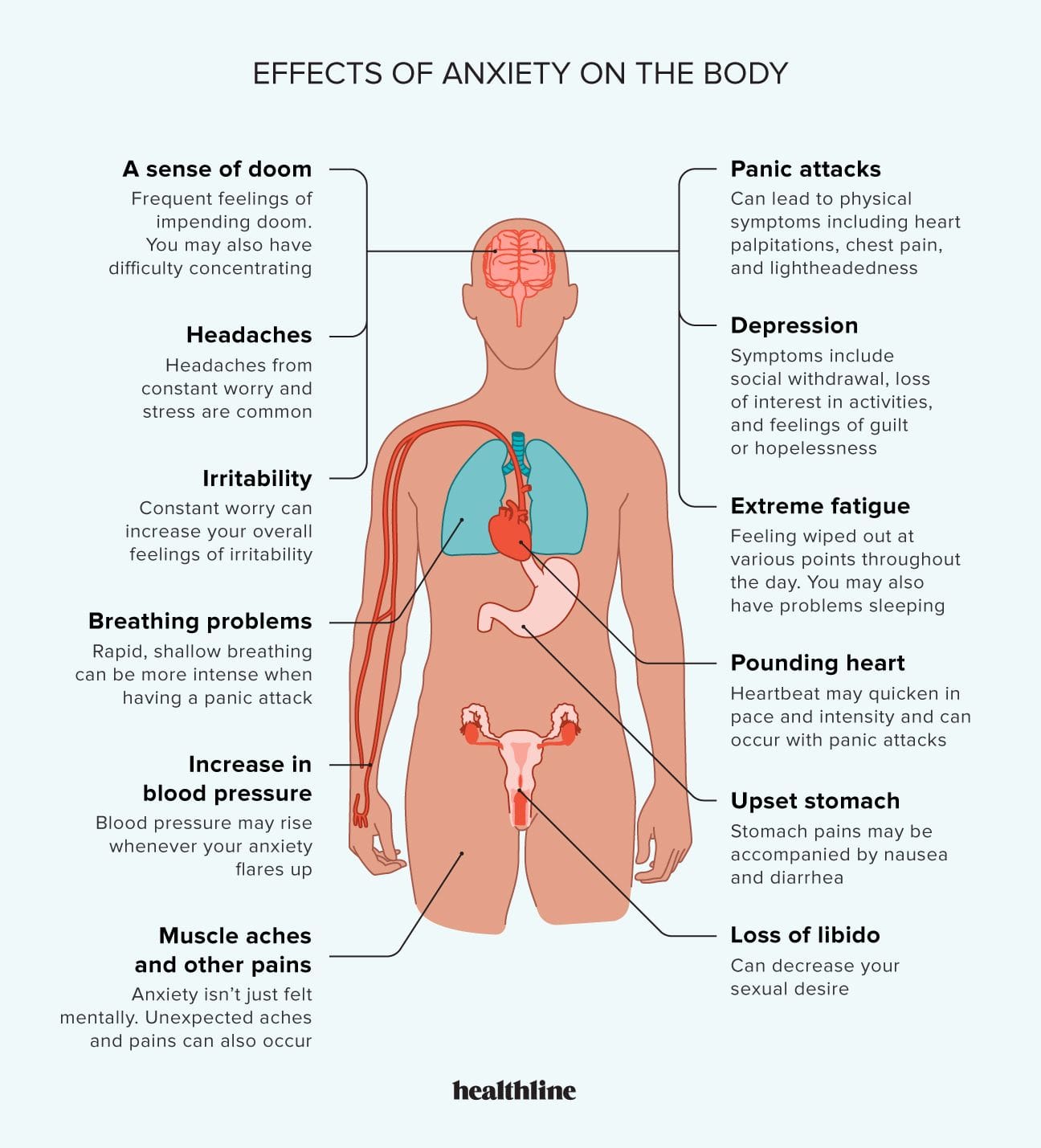
Symptoms of Anxiety
Physical symptoms
Physical symptoms of anxiety can manifest in various ways. Some common physical symptoms include increased heart rate, rapid breathing, trembling or shaking, sweating, feeling dizzy or lightheaded, gastrointestinal disturbances like stomachaches or nausea, tension headaches, and muscle tension or aches.
Psychological symptoms
Psychological symptoms of anxiety often involve persistent worries and intrusive thoughts. Common psychological symptoms include excessive fear or apprehension, difficulty concentrating or focusing, restlessness or feeling on edge, irritability, racing thoughts, and a sense of impending doom or panic.
Behavioral symptoms
Anxiety can also affect a person’s behavior and daily functioning. Some behavioral symptoms include avoidance of triggers or situations that cause anxiety, repetitive or compulsive behaviors, difficulty sleeping or staying asleep, changes in appetite, social withdrawal, and difficulty making decisions or taking action due to fear and worry.
Effects of Anxiety
Physical effects
Chronic anxiety can have negative effects on the body. Prolonged stress and anxiety can weaken the immune system, increase the risk of cardiovascular problems, and contribute to muscle tension and pain. It can also disrupt sleep patterns, leading to fatigue, reduced energy levels, and difficulties in maintaining overall physical health and well-being.
Mental health effects
Anxiety can significantly impact mental health, often leading to conditions such as depression, obsessive-compulsive disorder (OCD), and post-traumatic stress disorder (PTSD). The constant worry and fear associated with anxiety can also contribute to excessive stress levels, impairing cognitive function and affecting memory, concentration, and decision-making abilities.
Social effects
Anxiety disorders can have significant social consequences. Individuals may avoid social interactions, leading to feelings of isolation and loneliness. The fear of being negatively judged by others can hinder the formation of new relationships or cause strain in existing ones. Anxiety can also affect academic and career progress, resulting in missed opportunities and reduced productivity.
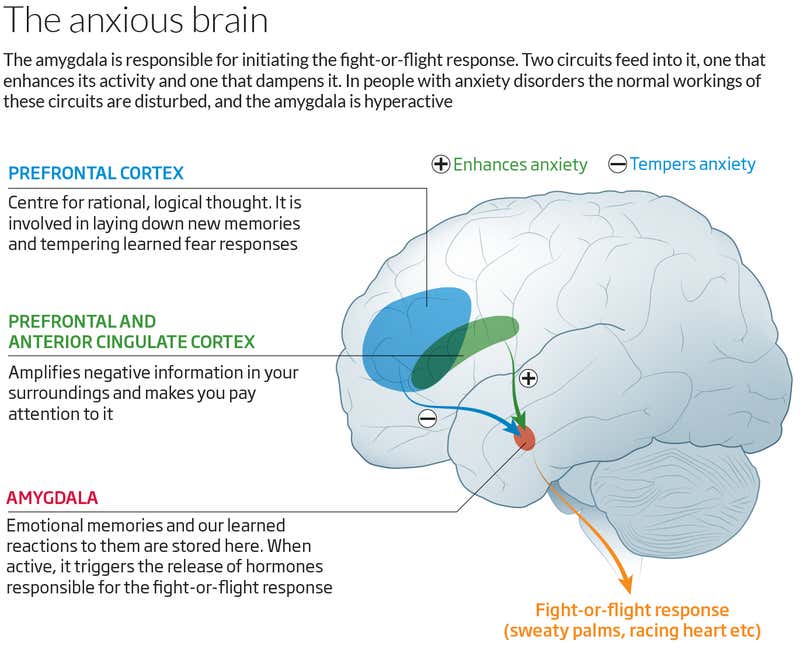
Complications of Anxiety
Substance abuse
Many individuals with anxiety disorders turn to substances such as alcohol or drugs as a way to cope with their symptoms. Unfortunately, using substances to self-medicate can lead to a harmful cycle of addiction and further exacerbate anxiety symptoms.
Depression
Anxiety and depression often coexist and can mutually reinforce one another. The ongoing stress and worry associated with anxiety can lead to feelings of sadness, hopelessness, and a decreased interest in previously enjoyed activities. If left untreated, this can progress into clinical depression, which requires its own specialized treatment.
Suicidal thoughts and actions
In severe cases, untreated anxiety disorders can lead to suicidal thoughts and actions. The overwhelming feelings of anxiety coupled with a sense of despair can make individuals see no way out of their situation, leading to extreme measures. It is crucial to seek help if you or someone you know is experiencing suicidal thoughts or behaviors.
Treatment for Anxiety
Therapy options
Therapy is a crucial component of treating anxiety disorders. Cognitive-behavioral therapy (CBT) is highly effective in helping individuals identify and change negative thought patterns and behaviors that contribute to anxiety. Other therapeutic approaches, such as exposure therapy, relaxation training, and mindfulness-based therapies, can also be beneficial in managing anxiety.
Medication options
In some cases, medication may be prescribed to help alleviate the symptoms of anxiety. Selective serotonin reuptake inhibitors (SSRIs), serotonin-norepinephrine reuptake inhibitors (SNRIs), and benzodiazepines are commonly prescribed medications for anxiety disorders. It is important to work closely with a healthcare professional to determine the most appropriate medication and dosage for individual needs.
Self-help strategies
In addition to therapy and medication, there are several self-help strategies that can aid in managing anxiety. These include maintaining a healthy lifestyle, engaging in regular exercise, practicing relaxation techniques such as deep breathing and meditation, getting adequate sleep, and seeking support from friends, family, or support groups.
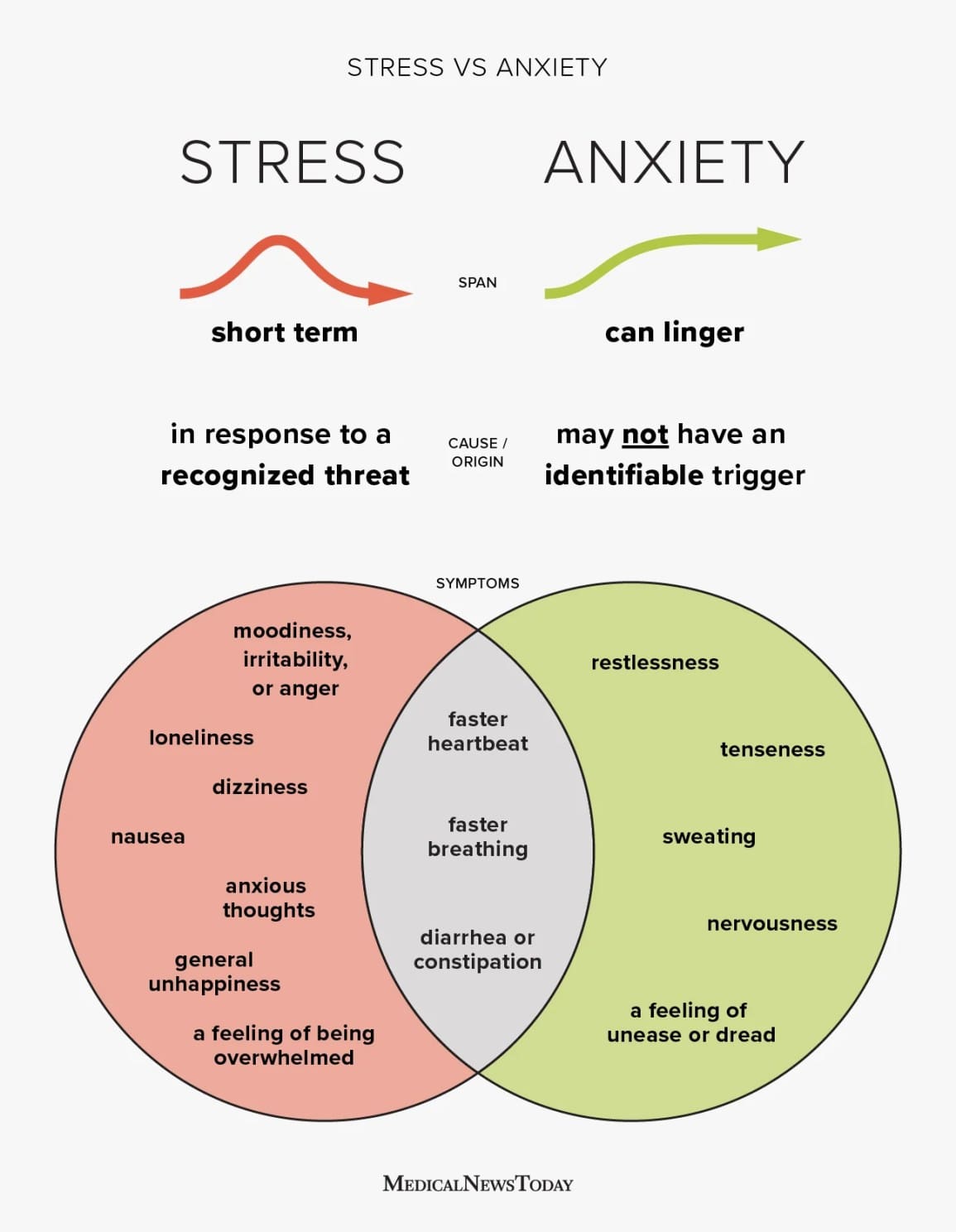
Coping with Anxiety
Stress management techniques
Stress management techniques can be effective in reducing anxiety levels. This can involve engaging in activities that promote relaxation and stress relief, such as yoga, tai chi, or engaging in hobbies and interests. Additionally, time management skills, setting realistic goals, and prioritizing self-care can all contribute to reducing stress and managing anxiety.
Relaxation exercises
Relaxation exercises can be an excellent tool for managing anxiety. Techniques such as deep-breathing exercises, progressive muscle relaxation, guided imagery, and mindfulness meditation can help calm the mind and body, reducing feelings of anxiety and promoting a sense of peace and well-being.
Support networks
Building a strong support network is crucial for individuals dealing with anxiety. This can involve seeking support from trusted family members and friends, participating in support groups or therapy groups, and connecting with online communities that offer understanding and guidance. Having a network of people who can provide emotional support and encouragement can make a significant difference in managing anxiety effectively.
Anxiety in Different Age Groups
Anxiety in children
Anxiety can affect individuals of all ages, including children. Children may experience anxiety due to various factors, such as school-related stress, separation anxiety, or specific phobias. It is important to provide children with a safe and supportive environment, open communication, and access to age-appropriate coping mechanisms to help manage their anxiety.
Anxiety in teenagers
Teenagers often face unique stressors and challenges that can contribute to the development of anxiety disorders. Academic pressures, social challenges, and hormonal changes can all contribute to increased anxiety levels. Creating an open and non-judgmental space for teenagers to express their feelings, promoting healthy coping skills, and encouraging professional help if necessary can assist in managing their anxiety effectively.
Anxiety in adults
Anxiety can persist into adulthood or develop later in life. Work-related stress, financial concerns, and the demands of adult responsibilities can contribute to anxiety in this age group. Seeking therapy, learning stress management techniques, and maintaining a healthy work-life balance are important for managing anxiety in adults.
Anxiety and Work
Effects of anxiety on work performance
Anxiety can significantly impact work performance. Increased levels of stress and worry can impair concentration, memory, decision-making, and problem-solving abilities. Individuals with anxiety may also experience difficulties with time management, meeting deadlines, and communicating effectively with colleagues. These factors can hinder productivity, lower job satisfaction, and increase the risk of burnout.
Tips for managing anxiety at work
To effectively manage anxiety in the workplace, it is essential to prioritize self-care. This can involve setting boundaries, practicing stress management techniques during breaks, and seeking support from supervisors or human resources when needed. Time management skills, maintaining a positive work environment, and utilizing organizational resources such as employee assistance programs can also contribute to a healthier work experience.
Seeking support in the workplace
Seeking support from colleagues and employers can be beneficial when dealing with anxiety at work. Openly communicating with supervisors about your needs, discussing any accommodations that may help manage anxiety, and seeking professional help if necessary can create a supportive and understanding work environment. Additionally, seeking peer support or forming alliances with co-workers who may have similar experiences can provide a sense of camaraderie and mutual support.
Anxiety and Relationships
Effects of anxiety on relationships
Anxiety can impact relationships in various ways. Constant worry and fear can lead to increased conflict, difficulty with trust and intimacy, and a tendency to withdraw or avoid social situations. Partners may struggle to understand and support someone with anxiety, leading to frustration and strain on the relationship.
Communication strategies
Effective communication is essential when anxiety is present in a relationship. Openly discussing fears, triggers, and concerns can help partners understand each other better. Active listening, validation, and expressing empathy can foster a supportive environment and strengthen the bond between partners.
Supporting a partner with anxiety
Supporting a partner with anxiety requires patience, understanding, and empathy. Educating oneself about anxiety disorders, avoiding judgment or criticism, and actively participating in the management of anxiety can be helpful. Encouraging self-care, accompanying them to therapy sessions if desired, and providing reassurance during moments of distress are all valuable ways to support a partner with anxiety.
Understanding anxiety is a crucial step in managing and ultimately overcoming its effects. By recognizing the causes, symptoms, and potential complications, individuals can seek appropriate treatment and adopt coping strategies to lead fulfilling lives. Whether in the workplace, relationships, or different age groups, understanding and support are the key ingredients in combatting anxiety and promoting mental well-being.
